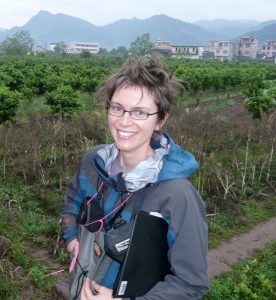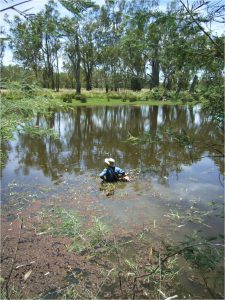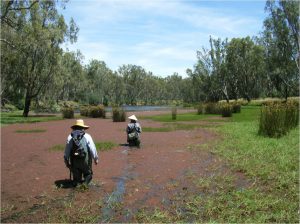Dr Jane Catford joined King’s Geography about 6 months ago. She is plant ecologist interested in interactions between vegetation and global environmental change – and approaches the topic of water from that perspective. She’s particularly interested in biological invasions and how exotic plant invasions can be both a symptom and cause of environmental change, including hydrological change. She mostly works in rivers, wetlands and grasslands.

After completing a BA/BSc at Monash University in Australia, Jane spent a year researching effects of urbanisation on benthic microalgae in streams, and then worked as an environmental consultant for a couple of years. This work was freshwater-focused, with projects including river restoration, environmental impact assessment, water-sensitive urban design, including the design of constructed wetlands. Her PhD at the University of Melbourne examined drivers of vegetation change in floodplain wetlands of the River Murray, Australia’s largest river system. Through hydrological modelling, vegetation surveys and plant traits (and a bunch of other things!), she found that the switch from native- to exotic-dominated vegetation was driven by river regulation and associated changes in wetland flooding regimes.

Since finishing her PhD, she’s worked as a vegetation specialist on a project funded by the Australia-China Environment Development Program that developed and trialled a rapid river health and environmental flows assessment protocol for China. The project was run in collaboration with the Chinese Ministries of Water Resources and Environmental Protection and the Chinese Research Academy of Environmental Sciences, and involved fieldwork and training in southern, central and northern China (where the tofu is mind blowing!). She has also been involved in projects that examine the impacts of climate change, and climate change adaptation, on freshwater and riparian systems, and has investigated the impact of invasive plants and animals on hydrological ecosystem services. She’s in involved in a industry-research linkage grant funded by the Australian Research Council that aims to quantify the interactive effects of flood regime restoration, native vegetation plantings, and removal of understorey vegetation in restoring degraded wetland forests. Some of her PhD students have worked on wetland restoration following river regulation and agriculture, and have quantified the amount of carbon stored in wetlands, the drivers of that storage, including the influence of plant traits.

At King’s, Jane’s “watery’ activities include: coordinating and teaching Applied Aquatic Sciences with Mike Chadwick next year; co-supervising Stefanie Kaupa (with Mark Mulligan), a NERC DTP PhD student, who is researching the impacts of agricultural land abandonment on hydrology in the mountain environments of Nepal and Colombia; supervising two Masters students examining vegetation along Hampshire’s chalk streams; and teaching/research in the Okavango Delta in Botswana as part of PLuS Alliance with the University of New South Wales and Arizona State University. Led by Marije Schaafsma at University of Southampton, Jane, Mark Mulligan, Arnout van Soesbergen and others have just submitted a GCRF proposal to work on the lower Shire River Basin (and the Elephant Marsh) in southern Malawi where human lives and livelihoods, hydrology and ecology are tightly integrated – and all increasingly threatened by ongoing climate and land use change.
If anyone would ever like to talk water and plants, Jane would be delighted!